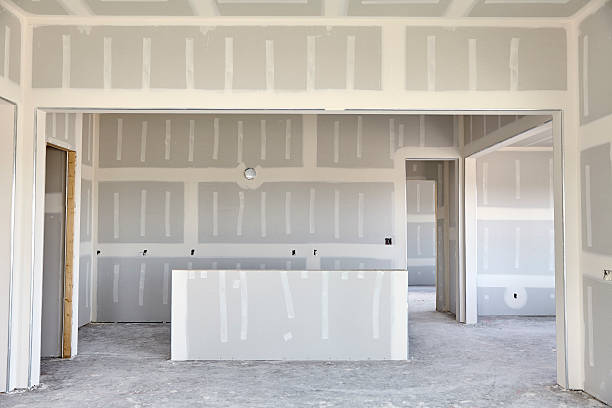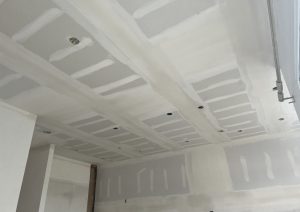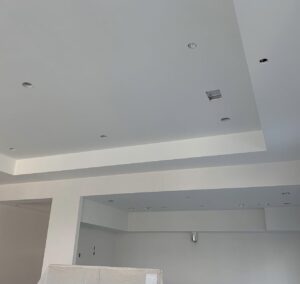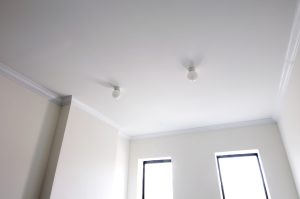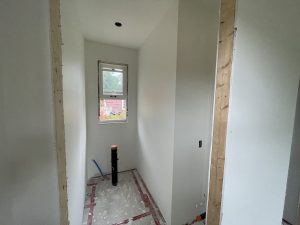Embarking on a drywall installation project presents homeowners with the opportunity to enhance their living space and take pride in a hands-on accomplishment. While do-it-yourself (DIY) projects can be immensely satisfying, it’s essential to recognize the scope of the task at hand and understand when it might be prudent to bring in professional help. In this comprehensive guide, we will explore the myriad factors that homeowners should consider when deciding between a DIY approach and hiring a professional for their drywall installation projects.
1. Project Complexity:
DIY:
Drywall projects vary in complexity, from simple repairs to more intricate installations. DIYers with a penchant for learning and a basic skill set can often tackle straightforward tasks, such as patching small holes or addressing minor cracks. A DIY approach is well-suited for smaller projects, such as installing drywall in a small room or managing minor touch-ups around the house.
Professional:
When faced with larger projects or tasks requiring a high degree of precision, a professional touch can make a significant difference. Intricate finishes, custom designs, or the installation of drywall in expansive spaces are best handled by experienced professionals. Their expertise ensures a polished outcome that may be challenging to achieve with a DIY approach.
2. Skill Level:
DIY:
Basic drywall installation tasks, including hanging and taping, are generally within reach for individuals with moderate DIY skills. Resources such as online tutorials, DIY guides, and community workshops can assist in the learning process. DIYers can gradually enhance their skills through practice, gradually taking on more challenging projects.
Professional:
Complex tasks like mudding, sanding, and achieving a flawless finish demand a higher level of expertise. Professionals bring years of experience and training to the table, allowing them to navigate challenges efficiently and produce a superior outcome. Their skills go beyond the basics, encompassing the nuances of drywall installation to deliver a professional-grade finish.
3. Time and Availability:
DIY:
One of the advantages of a DIY approach is the flexibility it offers in terms of time. DIYers can work at their own pace, dedicating weekends or evenings to the project. This flexibility allows for a more personalized experience, but it’s essential to consider the time commitment required for the specific project.
Professional:
Hiring a professional can be a time-saving option, especially for individuals with busy schedules. Professionals are adept at managing timelines and can complete the job efficiently, minimizing disruptions to the homeowner’s daily routine. If time is a crucial factor, enlisting the services of a professional can be a practical decision.
4. Tools and Equipment:
DIY:
Basic tools for drywall installation, such as a utility knife, drywall saw, and a drill, are often available at local hardware stores. This accessibility makes it feasible for DIYers to acquire the necessary tools without a substantial upfront investment. However, individuals should be aware of the importance of using quality tools for optimal results.
Professional:
Contractors come equipped with a range of specialized tools tailored for drywall installation. These tools are designed for efficiency and precision, contributing to the overall quality of the work. While professionals may have a higher initial investment in tools, their access to industry-grade equipment ensures a smoother and more professional execution of the project.
5. Budget Considerations:
DIY:
One of the primary motivations for taking on a DIY project is often the potential cost savings. DIYers can purchase materials and tools incrementally, spreading out the expenses. However, it’s crucial to factor in the cost of materials, the potential for mistakes that may require additional resources, and the value of the time invested in the project.
Professional:
While hiring a professional may come with a higher upfront cost, it often provides value in terms of time saved and a high-quality result. Professionals have established relationships with suppliers, allowing them to source materials at competitive prices. Additionally, their expertise reduces the likelihood of mistakes that could lead to extra expenses.
6. Complexity of Finishes:
DIY:
DIYers can achieve basic finishes, such as smooth walls or simple textures, with practice and dedication. Experimenting on a small scale before tackling a larger project is advisable for those looking to add unique touches to their drywall. While some textures and finishes are DIY-friendly, more intricate designs may require advanced skills.
Professional:
Achieving intricate finishes or specialized textures often requires the experienced hand of a professional. Contractors have the knowledge and skills to execute complex designs, ensuring a flawless and professional look. If the project involves custom finishes or specific design elements, hiring a professional is a prudent choice.
Conclusion: Striking the Right Balance
In conclusion, the decision between a DIY approach and hiring a professional for drywall installation hinges on a delicate balance of various factors. Assessing the project’s complexity, considering one’s skill level, evaluating time constraints, and accounting for budget considerations are pivotal steps in making an informed choice.
Guidance for DIY Enthusiasts:
- Start Small: For those new to drywall installation, start with small projects to build confidence and skills gradually.
- Educate Yourself: Utilize online resources, DIY guides, and community workshops to learn about best practices and techniques.
- Practice Finishes: Experiment with different finishes on scrap pieces of drywall to refine skills before tackling a larger project.
- Invest in Quality Tools: While starting with basic tools is reasonable, consider investing in quality tools as skills progress.
When to Call in the Pros:
- Complex Projects: If the project involves intricate finishes, custom designs, or extensive installations, professionals can ensure a high-quality result.
- Time Constraints: If time is a critical factor, hiring a professional can expedite the project, minimizing disruptions to daily routines.
- Specialized Finishes: For finishes requiring advanced techniques, such as detailed textures or artistic designs, professionals bring the necessary expertise.
- Budget Allows: If the budget allows, hiring a professional can provide peace of mind, quality assurance, and a polished final product.
Hybrid Approach:
- Consultation Services: Some professionals offer consultation services, providing guidance and expertise while allowing homeowners to execute parts of the project themselves.
- Partial Outsourcing: Homeowners can handle certain aspects of the project, such as basic installation, and hire professionals for more specialized tasks like finishing or intricate textures.
Final Considerations:
- Permitting: Check if local building codes require permits for the project and ensure compliance.
- Safety First: Regardless of the approach chosen, prioritize safety by using appropriate protective gear and following safety guidelines.
By carefully considering these factors, homeowners can strike the right balance between DIY enthusiasm and recognizing when to seek professional assistance. Each project is unique, and the decision-making process should align with individual preferences, skill levels, and project requirements.
In the realm of drywall installation, the journey is as important as the destination. Whether it’s the satisfaction of completing a DIY project or the peace of mind that comes with professional expertise, the ultimate goal is to create a living space that reflects the homeowner’s vision and meets their expectations. With the right approach and careful consideration, a successful and rewarding drywall installation awaits.

